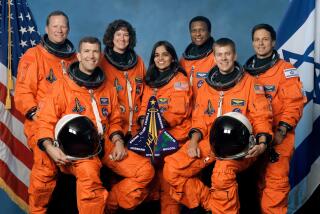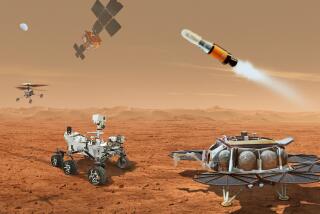It’s Not Exactly Star Trek I : But then again Columbia breakdown is not exactly Hubble II
The space shuttle Columbia orbits serenely around the Earth today, trailing a plume of failure, victory, extemporaneous astronomy, anger and--in the end--modified euphoria about its flawed mission.
The breakdown of computerized controls--for aiming three telescopes in Columbia’s cargo bay at quasars and exploding stars whose ultraviolet light cannot penetrate the Earth’s atmosphere--will be recorded as one more black eye in the sky for the National Aeronautics and Space Administration.
Still, the refusal of Columbia’s crew and its ground control team to give up has a heroic dimension that takes some of the bite out of the electronic failures. That they could improvise a fallback focusing scheme when all else failed does not salvage the mission or bring back the 12 years that some astronomers invested in it. But by Friday jerry-built controls were working well enough to transmit data never before seen--not all the scientists had hoped for, but enough to lead them eventually to thrilling new views of the universe.
Arthur F. Davidsen is the chief scientist of the Johns Hopkins University telescope that Columbia carried into orbit. No wonder he was one angry astronomer Thursday when the aiming mechanism failed and then the backup system collapsed behind it. The telescope should have been launched five years ago, but the mission was scrubbed after the Challenger disaster. Then it should have flown six months ago, but hydrogen leaks kept Columbia on the ground. When the telescope finally reached orbit, lint from overalls or flight suits--or somewhere--lodged in computers and closed them down.
But so completely did crew and controllers turn it around that by Friday Davidsen could say: “I think we’re winning this game now.”
That will not, and should not, save NASA from an organizational shake-up that is bound to follow a White House commission report on the agency next week. It can’t help but restore some of pride NASA’s crews are entitled to take in their work.






